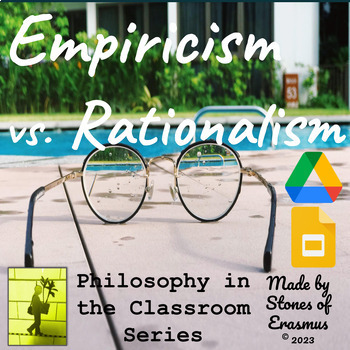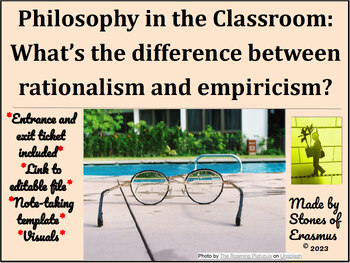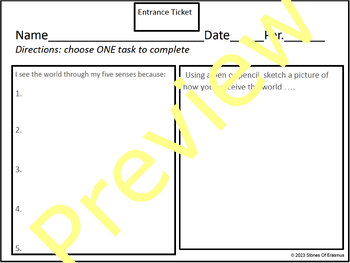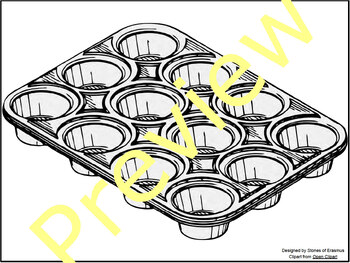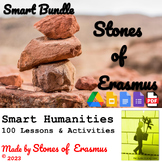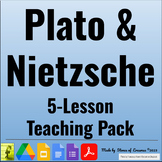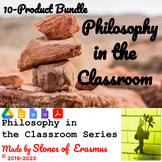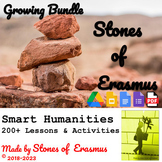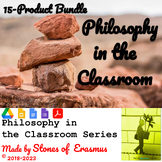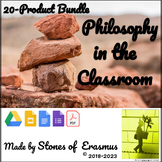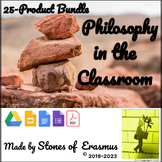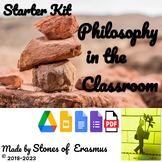Empiricism vs. Rationalism: Classroom Philosophy Lesson for Middle & HS
- Google Drive™ folder
- Easel Activity
- Easel Assessment

Also included in
- Expand your offerings and broaden the scope of a humanities curriculum for middle and high school with☝100 educational units! Entirely print + digital — Adobe Acrobat and Google Workspace power each download. Extra addition: Includes free-to-use out-of-the-box Easel Activities and Easel AssessmentsPrice $350.00Original Price $470.10Save $120.10
- I've combined five compelling Plato & Nietzsche resources I use in my middle and high school classes to infuse my lessons with philosophy and ethics-based content.With this bundle, you get the following:Plato's Allegory of the Cave Lesson ResourceIntroduce your students to this imaginative allegPrice $19.00Original Price $28.00Save $9.00
- I've combined ten compelling resources I use in middle and high school classes to infuse my lessons with philosophy and ethics-based content.With this bundle, you get the following:1. Plato's Allegory of the Cave Lesson ResourceIntroduce your students to this imaginative allegory about humankind's sPrice $30.00Original Price $46.00Save $16.00
- Everything related to broadening the scope of a humanities curriculum for middle and high school is included in this growing bundle.☝211 and growing educational units! Entirely print + digital — Adobe Acrobat and Google Apps power each download. Extra addition: Includes free-to-use out-of-the-box EaPrice $590.00Original Price $906.85Save $316.85
- What is the meaning of life? What is really real? Why is Socrates talking to random people? How do I know I am not dreaming right now? What if I could do anything I wanted without fear of punishment? What is the marshmallow test? How can I take really good notes in class? We've combined fifteen compPrice $40.00Original Price $57.50Save $17.50
- What is love? What is virtue? What is the meaning of life? What is really real? Why is Socrates talking to random people? Who is Glaucon and Protagoras, and why should it matter if I am in a cave? How do I know I am not dreaming right now? What if I could do anything I wanted without fear of punishmPrice $51.00Original Price $78.00Save $27.00
- What is love? What is virtue? What is the meaning of life? What is real? Why is Socrates talking to random people? Who are Glaucon, Protagoras, and why should it matter if I am in a cave or not? How do I know I am not dreaming right now? What if I could do anything I wanted without fear of punishmenPrice $70.00Original Price $105.50Save $35.50
- What is inside the philosopher's toolbox? It's the tools philosopher use to tinker with concepts. Introduce middle and high school students to the basic ideas and concepts of philosophical thinking -- with these five compelling resources. I've combined five educational digital downloads based on reaPrice $16.00Original Price $23.75Save $7.75
Description
How the mind works is an essential philosophical problem that forms the basis for a theory of knowledge. In this ready-to-go 45-minute jargon-free lesson, introduce your students to two famous theories - one touting that the mind is like a blank sheet of paper and the other that ideas are built-in to the mind like a muffin tin is pre-set with the shape of muffins (before you even bake 'em in the oven)! Which worldview makes the most sense? Introduce your students to this very important epistemological debate!
*The educational download contains PDF, Google Workspace, and Easel Activities and Assessment Files.*
Essential Question: What is the underlying foundation for all knowledge?
Topic: Epistemology, Theory of Knowledge
Duration: One 45-minute class period
This lesson resource includes the following features:
- 1 Classroom-tested Teacher's Guide for the Lesson
- 1 Entrance Ticket handout
- 2 Visuals
- 1 Note-taking template
- 1 Filled-in teacher's copy of the note-taking template
- Interactive Easel Activity & 10-Question Easel Assessment
- 10 useful links for further research on empiricism and rationalism
Suggested Classroom Use:
- TOK (International Baccalaureate Theory of Knowledge course)
- Introduction to Philosophy course
For other resources in my Philosophy in the Classroom series check out my popular resource on Plato's Allegory of the Cave. Navigate your web browser to my website to follow me on my journey. stonesoferasmus.com © 2023

